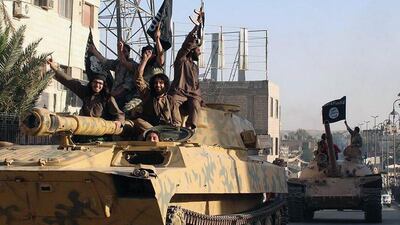What makes ISIL a lot like Starbucks? Both are expanding on account of their franchises. And both are doing so without much hindrance on the part of the US government and others.
This does not matter much when it comes to a coffee chain with no more insidious an aim than to persuade 65 countries its brew is a sophisticated part of the cultural backdrop. It is of huge concern when it is an extremist group with ambitions to enshrine its brutal ideas in a state, complete with a ban on Apple products and buses that run from its so-called capital Raqqa to Mosul.
The ISIL and Starbucks analogy comes straight from a devastatingly honest memo that Richard Stengel, the US state department’s under secretary for public diplomacy and public affairs wrote to his boss, secretary of state John Kerry.
It was written after foreign ministers from 24 countries met in Paris to discuss anti-ISIL strategy and was promptly leaked. It paints a dismal picture of a dysfunctional US-led multinational machine that is struggling to counter ISIL’s violent message, mostly because, as Mr Stengel writes, “the coalition does not communicate well, internally or externally...the UAE is reticent, the Brits are over-eager...” The reference is to the UAE and UK’s cochairmanship of the Countering Violent Extremism (CVE) working group at the Global Counterterrorism Forum, launched in New York in 2011.
Mr Stengel adds: “When it comes to the external message, our narrative is being trumped by ISIL’s. We are reactive, we think about ‘counter-narratives’, not ‘our narrative’.”
This is strong language. As a former managing editor of Time magazine, it’s a fair guess that Mr Stengel knows all about words – the weight they carry, the value they assume and the importance of using them carefully. As a senior member of the US government’s PR team (for that is what public diplomacy ultimately is), it would be reasonable to assume that he worded his memo with precision. And that he meant every word he wrote.
That is why it is hugely dispiriting, in the run up to the first anniversary of ISIL’s declaration of a caliphate, to consider the solutions proposed by Mr Stengel. These include: “A full-time coalition communications hub and daily thematic guidance.”
Dull is the word that comes to mind. But then Mr Stengel is not a marketing person, he’s a former journalist, who’s trained not to create the stories, just to report them.
Selling the anti-ISIL message requires imagination. Right after Britain learnt that Talha Asmal, a 17-year-old “ordinary Yorkshire lad”, had become the country’s youngest suicide bomber while on an ISIL mission in Iraq, the government was urged to “fight fire with fire”. A leading British legal expert, Alex Carlile, who reviewed UK terrorism legislation from 2001 to 2008, suggested enlisting the help of those who “create games on the internet...they must try to produce the same methods to show that the good guys sometimes win”.
One of the more imaginative ways to engage with potential recruits so far, has been Suleiman Bakhit’s comic books. Aimed at children in poor neighbourhoods in Jordan, they attempt to replace what he calls ISIL’s folksy preaching on “terrorism as a heroic journey” with other Arab heroes. Like Mr Stengel, Mr Bakhit believes the coalition is losing the propaganda war, but he doesn’t prescribe more government spokesmen, just an amped-up battle of ideas. “The most important story humans have is the classic hero’s journey,” he says. “Right now, all governments are saying to kids is: ‘Don’t be a terrorist.’ The extremists are saying: ‘Be a hero.’ It’s obvious which narrative is stronger.”
The numbers back this up. Iraqi prime minister Haider Al Abadi says that there are more foreign ISIL fighters in Iraq now than Iraqi and it’s up to the countries from which they come to address the “problem”.
But how? Despite the frenzy of breast-beating and fighting talk triggered far and wide by ISIL’s savagery and spread, the public discourse seems to oscillate between alarmism and apathy. Consider Australian prime minister Tony Abbott’s “Daesh is coming” call exactly a week ago at a CVE summit in Sydney. ISIL is coming, he declared, “if it can, for every person and for every government with a simple message: ‘Submit or die’.” He went on to list the places where the group’s franchises have a presence: Libya, Nigeria, the Horn of Africa, the Arabian peninsula and with ambitions in South-east Asia.
And yet, as we learn from Mr Stengel’s memo, only now, months after Boko Haram declared fealty to ISIL, is the coalition’s lead communications centre even bothering to recruit a Hausa speaker.
Hausa or Hindustani, there is decided confusion about what to say. Is it appropriate, as Mr Abbot did, for world leaders to refer to ISIL’s “death cult” in an attempt to force young people to confront the group’s morbid reality? Or is this counterproductive because it gives coherent, if chilling, meaning to actions that are essentially just violent crime?
The CVE industry, as the anti-radicalisation business is called, has become big business in its restless search for “social media solutions” and messaging that purports to “discredit violent extremist narratives and amplify positive alternatives”. But if only it were as simple as big words and big bucks.
rroshanlall@thenational.ae
On Twitter: @rashmeerl


